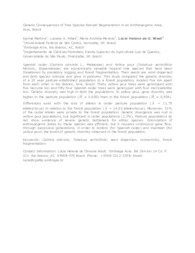Genetic consequences of tree species natural regeneration in an anthropogenic area, Acre, Brazil.
Genetic consequences of tree species natural regeneration in an anthropogenic area, Acre, Brazil.
Author(s): MARTINS, K.; RIBAS, L. A.; MORENO, M. A.; WADT, L. H. de O.
Summary: Spanish cedar (Cedrela odorata L., Meliaceae) and Yellow poui (Tabebuia serratifolia Nichols., Bignoniaceae) are economically valuable tropical tree species that have been threatened by predatory logging and forest fragmentation. Their seeds are wind-dispersed and both species colonize and grow in pastures. This study compared the genetic diversity of a 30 year pasture-established population to a forest population, located five km apart from each other in Rio Branco, Acre, Brazil.
Publication year: 2008
Types of publication: Abstract in annals or event proceedings
Unit: Embrapa Acre
Observation
Some of Embrapa's publications are published as ePub files. To read them, use or download one of the following free software options to your computer or mobile device. Android: Google Play Books; IOS: iBooks; Windows and Linux: Calibre.
Access other publications
Access the Agricultural Research Database (BDPA) to consult Embrapa's full library collection and records.
Visit Embrapa Bookstore to purchase books and other publications sold by Embrapa.

